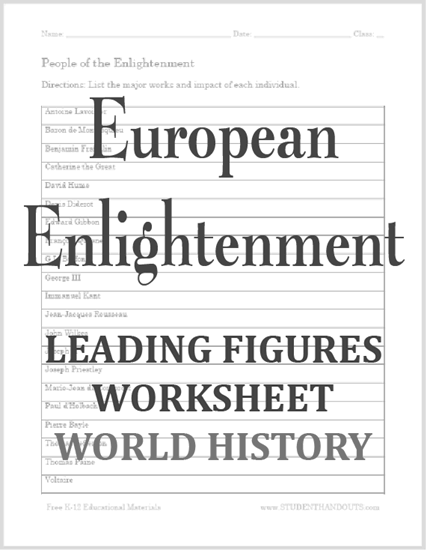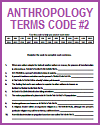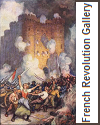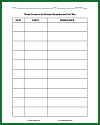| People of the Enlightenment Note-taking Worksheet |
|---|
| www.studenthandouts.com ↣ World History ↣ Enlightenment ↣ Enlightenment Worksheets |
| Directions: List the major works and impact of each individual. Antoine Lavoisier; Baron de Montesquieu; Benjamin Franklin; Catherine the Great; David Hume; Denis Diderot; Edward Gibbon; François Quesney; G.L. Buffon; George III; Immanuel Kant; Jean-Jacques Rousseau; John Wilkes; Joseph II; Joseph Priestley; Marie-Jean de Cordorcet; Paul d'Holbach; Pierre Bayle; Thomas Jefferson; Thomas Paine; Voltaire. |
 |
    |
|
Click here to print. Answers will vary.
Antoine Lavoisier: Known as the "father of modern chemistry," Lavoisier identified and named oxygen and hydrogen. He helped develop the metric system and reformed chemical nomenclature, playing a key role in transforming chemistry into a quantitative science. Baron de Montesquieu: A French political philosopher, Montesquieu is best known for The Spirit of the Laws, where he proposed the separation of powers in government--a foundational concept for modern democracies and constitutional design. Benjamin Franklin: An American Enlightenment thinker, inventor, and diplomat, Franklin championed reason, science, and civic responsibility. His experiments with electricity and his role in shaping American independence reflected Enlightenment ideals in practice. Catherine the Great: Empress of Russia and an "Enlightened Despot," Catherine supported education, legal reform, and Westernization. She corresponded with Voltaire and Diderot and tried to modernize Russia using Enlightenment principles. David Hume: A Scottish philosopher and historian, Hume emphasized empiricism and skepticism. He questioned traditional religious beliefs and laid the groundwork for modern cognitive science and moral philosophy. Denis Diderot: Co-editor of the Encyclopédie, Diderot aimed to compile and spread human knowledge. His writings challenged religion and traditional authority, promoting reason, progress, and intellectual freedom. Edward Gibbon: Gibbon was a British historian best known for The Decline and Fall of the Roman Empire. His work reflected Enlightenment ideals, emphasizing reason, causation, and a critical view of religion's historical role. François Quesnay: A leading French physiocrat, Quesnay argued that agriculture was the source of national wealth. He promoted laissez-faire economic policies and was an early advocate for free markets and rational economic planning. Georges-Louis Leclerc, Comte de Buffon: Buffon was a naturalist who wrote Histoire Naturelle, an ambitious encyclopedia of natural science. He challenged biblical chronology and proposed ideas about species variation and the Earth's age. George III: King of Great Britain during the American Revolution, George III's reign saw growing challenges to monarchical power. Though not an Enlightenment figure himself, he played a key role in shaping Enlightenment-era conflicts over liberty and governance. Immanuel Kant: A central figure in Enlightenment philosophy, Kant argued for autonomy, reason, and moral duty. His essay "What is Enlightenment?" famously defined it as "man's emergence from self-imposed immaturity." Jean-Jacques Rousseau: Rousseau emphasized emotion, natural human goodness, and social contract theory. His work inspired democratic revolutions and later Romanticism. The Social Contract argued that government must reflect the general will. John Wilkes: A British politician and journalist, Wilkes fought for freedom of the press and parliamentary reform. His clashes with the government made him a symbol of liberty and civil rights in Britain. Joseph II: An Enlightened monarch of Austria, Joseph II pursued radical reforms including religious tolerance, legal reform, and the abolition of serfdom. His progressive policies often met resistance and had limited lasting success. Joseph Priestley: An English theologian, chemist, and political theorist, Priestley discovered oxygen and supported religious freedom and republican ideals. He was a friend of American revolutionaries and a strong advocate for Enlightenment science. Marie-Jean de Condorcet: A French philosopher and mathematician, Condorcet promoted education, women's rights, and democratic reform. He believed in human progress and the power of reason to improve society over time. Paul d'Holbach: A French-German philosopher and staunch atheist, d'Holbach wrote The System of Nature, advocating for materialism and reason over religion. His salon was a hub for radical Enlightenment thinkers. Pierre Bayle: A French philosopher and skeptic, Bayle's Historical and Critical Dictionary challenged religious orthodoxy and promoted toleration. He is often seen as a forerunner of the Enlightenment. Thomas Jefferson: A Founding Father of the United States, Jefferson was deeply influenced by Enlightenment thought. He authored the Declaration of Independence and advocated for liberty, education, and separation of church and state. Thomas Paine: Author of Common Sense and The Rights of Man, Paine was a radical political thinker who supported revolution, individual rights, and democratic government. His plain language made Enlightenment ideas accessible. Voltaire: A champion of civil liberties, Voltaire used wit and satire to attack intolerance, censorship, and religious dogma. He advocated for freedom of speech and religion, and influenced reform across Europe. |
| Enlightenment Books and Films | Enlightenment Outlines and PowerPoints |
| Enlightenment Study Games | Enlightenment Maps and Pictures |
| Enlightenment Miscellany | Enlightenment Worksheets |
| www.studenthandouts.com ↣ World History ↣ Enlightenment ↣ Enlightenment Worksheets |














































